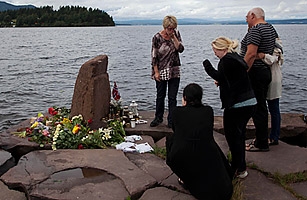
Relatives of an Anders Breivik victim gather to observe a minute's silence across the water from the island of Utoya on July 25, 2011
On July 22, Norway experienced its worst single spasm of violence since World War II. In Oslo, a car bomb detonated near a set of prominent government buildings, killing eight people and shocking Norwegians who watched TV footage of smoke pouring from the heart of the otherwise sleepy seaside capital. The news was about to get far grislier: at a youth summer camp run by Norway's ruling center-left Labour Party on the island of Utoya, a gunman had mowed down 69 people.
While some commentators leaped to pin the attacks on Islamist terrorists, authorities eventually found one culprit: Anders Behring Breivik, a 32-year-old Norwegian and far-right fanatic who shortly before the attacks posted online a manifesto filled with hate for immigrants, multiculturalists and leftists. Breivik, who has admitted his guilt, has been diagnosed as a paranoid schizophrenic by a panel of psychiatrists who ruled he was "insane" during the attacks. The ruling could see him eventually be committed to a psychiatric institution rather than prison at the conclusion of his trial, set to resume in April 2012. Breivik's hideous deeds prompted a moment of introspection in Norway — whose government has played such a prominent role in trying to author peace in other parts of the world — regarding the rise of far-right extremism there and elsewhere in Europe.